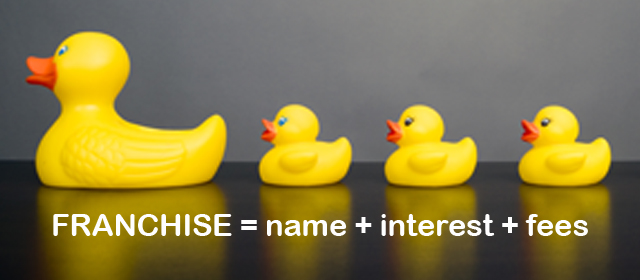Franchise 101: Dickey’s Arbitration Pit; and If It Walks Like a Franchise…
Franchisor 101: Dickey’s Arbitration Pit

A federal appeals court upheld a lower court’s refusal to order arbitration against a franchisee who bought an existing franchise. This was despite a provision in the franchise agreement to arbitrate “most disputes.”
In Campbell Investments, LLC v. Dickey’s Barbecue Restaurants, Inc., the franchisee, “Campbell,” entered into a Development Agreement to open two new Dickey’s Barbecue Pit restaurants in Utah. Dickey’s and Campbell signed a franchise agreement for one of the new locations. The Development and Franchise Agreements both said “most disputes” were subject to arbitration.
Campbell did not develop any new Dickey’s restaurants. Instead, Campbell bought an existing franchise in South Jordan, Utah from a franchisee, using an Asset Purchase Agreement. The Asset Purchase Agreement said nothing about the franchise agreement between Dickey’s and the prior franchisee, which had the same provision to arbitrate “most disputes.” Dickey’s and Campbell did not sign a new franchise agreement for the South Jordan Restaurant.
The relationship deteriorated, with Campbell ceasing operations and suing Dickey’s. Dickey’s moved to compel arbitration.
The Federal Arbitration Act mandates that agreements to arbitrate be in writing. Dickey’s argued that Campbell was bound by the written franchise agreement—and standard arbitration provision—that governed the South Jordan Restaurant, because Campbell “assumed” the obligations of that agreement. Dickey’s also argued that Campbell’s conduct or course of dealing with Dickey’s showed its agreement to the South Jordan Franchise Agreement, and that Campbell knew, through Dickey’s FDDs and other documents that disputes with Dickey’s would be arbitrated.
The district court and Tenth Circuit disagreed. The simple question was whether Dickey’s and Campbell signed a written agreement—including an arbitration provision—that governed disputes over operating the South Jordan Restaurant. They had not. Dickey’s could not show that Campbell assumed the written obligations of the South Jordan franchise agreement. The fact that the parties entered into other agreements and Dickey’s disclosed arbitration in its FDD did not change the result: Absent a written arbitration agreement between the parties over the dispute at hand (the South Jordan Restaurant), arbitration could not be compelled.
Franchisors intent on arbitrating disputes with franchisees who buy existing franchises should confer with counsel to make sure a written arbitration agreement is in place with the new franchisee. As shown in this case, absent written assumption of the existing franchise agreement, the franchise agreement between the franchisor and prior franchisee will not automatically bind the new franchisee to the arbitration clause.
Franchisee 101: If it Walks Like a Franchise, Talks Like a Franchise, it Might Be a Franchise

Twin City Lodging LLC bought a Best Western Hotel in Mankato, Minnesota, then entered into a “Membership Agreement” with Best Western International. Best Western granted Twin City a license to operate the hotel under Best Western’s brand. Not long after, Best Western terminated Twin City’s membership and sued for breach of contract, trademark infringement and other claims. Twin City counterclaimed. Each moved to dismiss the other’s claims and the rulings hinged on whether Best Western was a franchisor under the Minnesota Franchise Act (“MFA”).
Twin City’s counterclaim alleged violations by Best Western of the MFA. Best Western moved to dismiss the counterclaim, arguing it was not a franchisor subject to the MFA but rather a non-profit corporation. The judge found Twin City plausibly alleged Best Western was subject to the MFA and rejected Best Western’s argument that it was a “nonprofit marketing cooperative,” not a franchisor.
The judge concluded that all three requirements for a franchise were met:
(1) a right granted to Twin City to engage in business using Best Western’s trade name or other commercial symbol;
(2) a “community of interest” in the marketing of goods or services between the franchisee and franchisor, because the parties had a shared interest in operating a successful hotel under Best Western’s name; and
(3) a “franchise fee” paid by the franchisee in the form of “entrance fees” and “annual dues” paid to Best Western.
The judge then found that Twin City sufficiently pleaded violations based on Best Western’s failure to register, and termination without required notice or good cause. However, Twin City’s claim that Best Western unlawfully discriminated was dismissed for failure to allege facts showing that Twin City was treated differently than any other comparable franchise.
If a business relationship feels like a franchise relationship, there’s a good argument, and good chance, that it is a franchise subject to state and federal franchise rules and regulations. Such rules and regulations seek to benefit franchisees and can be invoked if the franchisee is mistreated by the franchisor or the business relationship is wrongfully terminated.